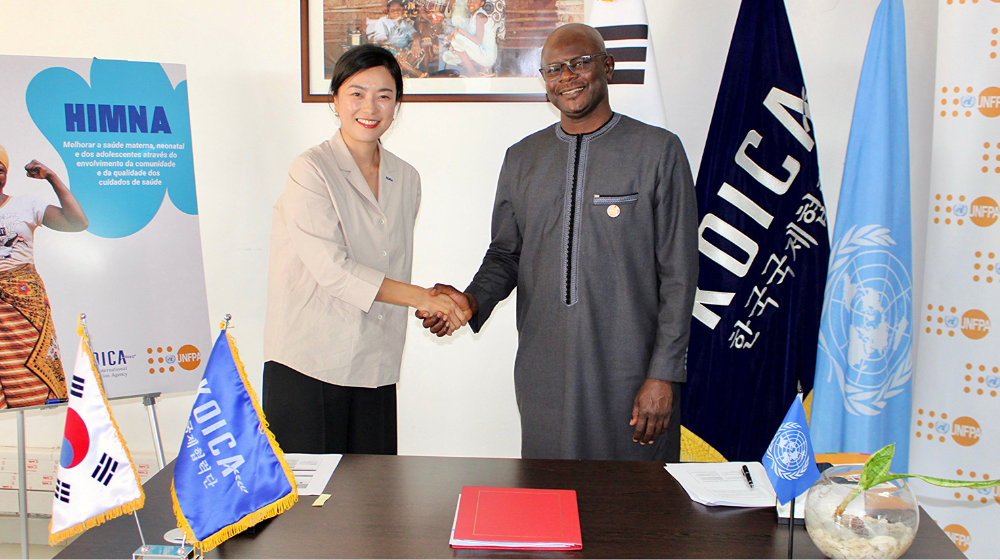Maputo, Mozambique—The United Nations Population Fund (UNFPA) and the Korea International Cooperation Agency (KOICA) officially signed the “Health Improvements for Mothers, Neonates, and Adolescents in Niassa Province” (HIMNA, “Stay Strong” in its English translation) during a ceremony yesterday in Maputo.
With a generous USD 7.5 million contribution from KOICA, this five-year initiative (2024-2029) will focus on transforming health outcomes for women and young people in the underserved districts of Lichinga, Cuamba, Mandimba, and Mecanhelas in Niassa Province.
Niassa remains one of Mozambique’s most underserved regions, grappling with maternal and neonatal mortality rates well above the national average, pervasive adolescent pregnancies, and alarming levels of chronic malnutrition. The HIMNA Project seeks to address these challenges comprehensively, aiming to achieve critical reductions in maternal and neonatal mortality and decrease adolescent pregnancy rates.
Through coordinated efforts with the Ministry of Health (MISAU), the Provincial Directorate of Health of Niassa (DPS Niassa), and selected NGO partners, the project will employ a multi-sectoral approach to reducing the maternal mortality ratio to less than 190 per 100,000 live births, the neonatal mortality ratio to less than 19.3 per 1,000 live births, and the adolescent pregnancy rates to less than 47.3% in Niassa province.
Key interventions will include strengthening health facilities, empowering communities with accurate sexual and reproductive health information, challenging harmful social norms, and enhancing health system oversight.
The HIMNA Project will create sustainable, high-quality healthcare services for women and adolescents in Niassa by addressing these fundamental gaps in healthcare access, education, and infrastructure.
"KOICA’s contribution of USD 7.5 million will support UNFPA’s efforts to strengthen access to healthcare services for pregnant women and adolescents through the HIMNA Project. This initiative aims to expand access to family planning services and raise awareness about the prevalence of gender-based violence in the region. We hope this collaborative effort will achieve its intended goals and strengthen the partnership between UNFPA and KOICA.," said Jinjoo Hyun, the KOICA Country Director.
“Niassa is a priority for UNFPA in Mozambique, not only because of its stark health challenges but because of the transformative potential that a project like HIMNA can unlock for women, young people, and the entire province. This initiative is about equity, investing in people, and fostering sustainable, life-saving change and services,” said Cheikh Fall, UNFPA Interim Representative in Mozambique.
The HIMNA Project underscores the importance of strategic partnerships in advancing Mozambique’s health and development goals. By empowering communities and prioritising maternal, neonatal, and adolescent health, this collaboration marks a significant step toward reducing preventable deaths and promoting well-being for all.
About UNFPA
Creating a world where every pregnancy is wanted, every childbirth is safe, and young people’s potential is fulfilled.
UNFPA, the United Nations sexual and reproductive health agency, deals with population issues and is responsible for expanding the possibilities for women and young people to lead healthy sexual and reproductive lives. UNFPA works to accelerate universal access to sexual and reproductive health, including voluntary family planning and safe motherhood and seeks to realise the rights and opportunities of young people. UNFPA also supports countries using population data to anticipate future challenges, offering technical assistance that strengthens and empowers its partners.
About KOICA
The Korea International Cooperation Agency (KOICA) is South Korea’s leading development cooperation agency, dedicated to fostering sustainable development and improving the quality of life in developing countries. Since its establishment in 1991, KOICA has been working to achieve global development goals through grant aid programs, technical cooperation, and capacity-building initiatives.
KOICA focuses on key areas such as healthcare, education, gender equality, rural development, governance, and environmental sustainability. By partnering with governments, international organisations, and civil society, KOICA implements projects that address urgent needs and promote long-term development.
Through its innovative and inclusive approach, KOICA aims to contribute to building a better world by reducing poverty, empowering communities and advancing global development.



